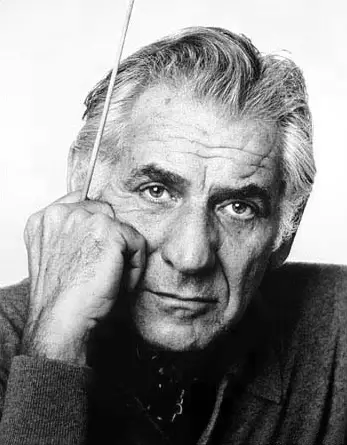Leonard Bernstein
(1918 - 1990)

Leonard Bernstein has his aunt to thank for introducing him to music. When he was 10 years old, his aunt gave his family her piano. He was so fascinated with it that he began to play by ear and to compose simple pieces for it. Despite his father’s apprehensions about musicians, he soon began formal piano lessons.
Born in Lawrence, Massachusetts, on August 25, 1918, Bernstein was the son of Russian immigrants, Samuel Joseph and Jennie, nee Resnick, Bernstein. His father was in the hair goods and beauty supply business. Bernstein attended Boston Latin School, where he received a well-rounded early education. He graduated from Harvard in 1939 with a degree in music. He continued his studies at the Curtis Institute of Music in Philadelphia, where there were many leading musicians on the staff.
When World War II broke out, Bernstein was just beginning his career. His first work, the Clarinet Sonata had been published and he was busy producing operas for the Boston Institute of Modern Art. He received his first major opportunity in September 1942, when he was appointed as the assistant conductor at Tanglewood, Massachusetts.
This position gave him entree to many other opportunities. In the 1942-43 season, he conducted concerts in New York and in 1943, he was appointed as the assistant conductor of the New York Philharmonic. On November 13, 1943, Bernstein was asked to conduct the Philharmonic in place of Arthur Rodzinski, who had become ill. His success was instantaneous. The New York Times praised his debut on its front page and he received the plaudits of his colleagues.
Bernstein was very sensitive to the feelings of people. When he was a guest conductor with the Israel Philharmonic, he was asked by parents in the audience to write a work to honor their 19-year-old son, a flautist, who had fallen in the 1973 Yom Kippur War. Bernstein said, “I never knew Yadin Tannenbaum, but I knew his spirit.” He wrote “Halil,” which he dedicated to the flautist and his fallen brothers. Bernstein wrote many pieces dealing with the world’s cruelty and injustices. His feelings were expressed in his works the Jeremiah Symphony, the Age of Anxiety, Candide, Mass, and Kaddish
Bernstein was also known for his popular music. He composed music for Fancy Free, Wonderful Town, West Side Story and The Dybbuk. He also composed a one-act opera, Trouble in Tahiti, a piano piece, Touches, and a piece in memory of Andre Kostelanetz titled A Musical Toast.
Bernstein was a leader in introducing music to the youth through his television program, the Young People’s Concerts. He displayed much enthusiasm and vigor in these concerts. Bernstein resigned as director of the New York Philharmonic in 1969, following the death of his Chilean born wife, Felicia Montealegre Cohn. The New York Philharmonic honored him by giving him the title conductor laureate.
Bernstein’s contributions cannot be measured. He will always be a giant in American music. He died on October 14, 1990.
Source: This is one of the 150 illustrated true stories of American heroism included in Jewish Heroes & Heroines of America : 150 True Stories of American Jewish Heroism, © 1996, written by Seymour "Sy" Brody of Delray Beach, Florida, illustrated by Art Seiden of Woodmere, New York, and published by Lifetime Books, Inc., Hollywood, FL.
Photo: Jack Mitchell, CC BY-SA 4.0 via Wikimedia Commons.


